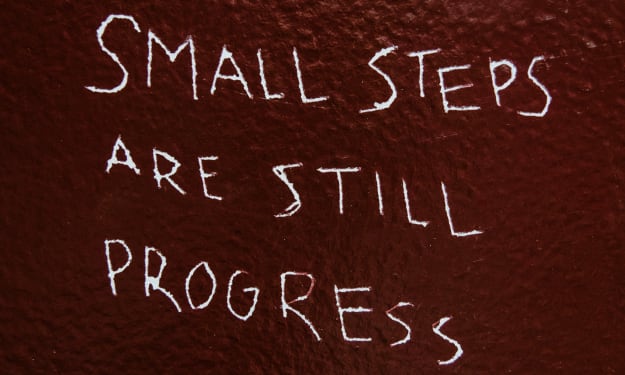The Art of Letting Go: Strategies for Moving Forward
Releasing the Past to Create a Brighter Future

Change is a fundamental part of life. Everything around us is in constant motion, whether we like it or not. But for some of us, change can be difficult. We may feel attached to things or people. Learning to let go is an important skill for personal growth and development. This article explores strategies for overcoming attachment and embracing change.
Understand Attachment:
Attachment is the deep emotional bond we form with people, things, and ideas. Bonding is a natural human tendency that brings great joy and fulfillment to our lives. But attachment can also lead to suffering, especially if you get too attached.
Psychologist John Bowlby was one of his pioneers in the study of attachment theory. According to Bowlby, attachment is a survival instinct that provides a sense of security. We form bonds with our parents in early childhood, and those bonds become the blueprint for our future relationships. As they grow, they form bonds with friends, romantic partners, pets, and even objects such as houses and cars.
Attachment can become a problem when you become overly dependent on the thing you are attached to. Tying our sense of identity, well-being, or security to external factors can leave us vulnerable to emotional pain when those factors change or are removed.
Why We Struggle to Let Go?
Letting go can be difficult for many reasons. For one thing, we may fear the unknown. Change can be scary because it often involves stepping out of our comfort zone. We may be familiar with the current situation, even if it’s not good for us. And you may feel like you’re missing out on something valuable, like a relationship, job, or belief system. But clinging to the past can harm our health. If we cling too much to things that no longer serve us, we can experience negative emotions such as fear, sadness, and anger. By learning to let go, we can move forward with greater ease and grace.
Strategies For Letting Go:
Acceptance
The first step to letting go is acceptance. We must accept that change is inevitable and that clinging to the past will only lead to suffering. Acceptance does not mean that we have to like or approve of the situation, but rather that we choose to acknowledge that the situation exists and let go of our resistance.
“Letting go means to come to the realization that some people are a part of your history, but not a part of your destiny.” – Steve Maraboli
Mindfulness
Practicing mindfulness can help you become more aware of your thoughts and feelings. When we are mindful, we are able to observe our obsessions without judgment and create space to be present without being overwhelmed by them. Mindfulness also helps us stay grounded in the present moment rather than dwelling on the past or worrying about the future.
“Mindfulness is the aware, balanced acceptance of the present experience. It isn’t more complicated than that. It is opening to or receiving the present moment, pleasant or unpleasant, just as it is, without either clinging to it or rejecting it.” – Sylvia Boorstein
Gratitude
Gratitude is a powerful antidote to obsession. Focusing on what you are grateful for distracts you from what you are obsessed with. Cultivating gratitude allows you to be grateful for what you have in the present moment instead of constantly striving for more.
“Gratitude makes sense of our past, brings peace for today, and creates a vision for tomorrow.” – Melody Beattie
Self-Reflection
Self-Reflection is an essential tool for letting go of attachments. By taking the time to examine your thoughts and beliefs, you can identify areas where you may be getting too fixated. You can ask yourself questions such as: Why am I attached to this person/thing/idea? What if I let it go? Introspection helps us to be clear and make conscious choices about what to keep and what to let go in our lives.
“The unexamined life is not worth living.” – Socrates
“Self-reflection is the school of wisdom.” – Baltasar Gracian
Focus On The Positive
When we are attached, it is easy to focus on the negative aspects of our situation. But if you keep your focus on positive things, you can let go of your attachments. By focusing on the good things, we can be grateful for the good things in life.
“Positive thinking will let you do everything better than negative thinking will.” – Zig Ziglar
Practice Self-Care
Taking care of yourself is essential to letting go of attachments. When you’re stressed, tired, or overwhelmed, it’s hard to let go of your obsessions. Practicing self-care makes us feel more grounded and centered, making it easier to let go. Self-care can take many forms, including: B. Exercise, meditation, spending time in nature, spending time with loved ones.
“Self-care is not selfish. You cannot serve from an empty vessel.” – Eleanor Brown
Seek Support
Letting go can be difficult, but it’s okay to ask for help. Seeking support from a friend, family member, or therapist can give you the guidance and encouragement you need to let go of the attachment. Talking about your feelings and fears can help broaden your horizons and make you feel less alone.
“The greatest healing therapy is friendship and love.” – Hubert H. Humphrey
Conclusion:
Learning to let go of attachments is a process that takes time and practice. Not always easy, but essential for personal growth and development. By practicing acceptance, mindfulness, gratitude, introspection, focusing on the positive, practicing self-care, and seeking support, you can learn to let go of attachments and embrace change.
“The only way to make sense out of change is to plunge into it, move with it, and join the dance.” – Alan Watts
About the Creator
Enjoyed the story? Support the Creator.
Subscribe for free to receive all their stories in your feed. You could also pledge your support or give them a one-off tip, letting them know you appreciate their work.






Comments (1)
I love the message in this 🥰